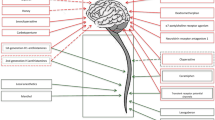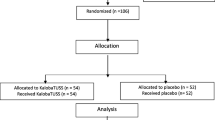Abstract
Acute cough is a common complaint in children and adolescents, with cough remedies commonly self-prescribed by parents/caregivers to manage typically self-limiting illnesses. Drugs that affect mucociliary factors or target the cough reflex have equivocal evidence of efficacy, while non-drug natural compounds such as honey have moderate quality evidence for efficacy and tolerability. Nevertheless, cough remedies continue to be used despite limited data in the paediatric population; further clinical trials are required for the various options currently available. Acute cough management should also include standardized treatment algorithms and increased parent/caregiver education.
Similar content being viewed by others
References
Morice AH, Millqvist E, Bieksiene K, et al. ERS guidelines on the diagnosis and treatment of chronic cough in adults and children. Eur Respir J. 2020;55(1):1901136.
Manti S, Tosca MA, Licari A, et al. Cough remedies for children and adolescents: current and future perspectives. Pediatr Drugs. 2020;22(6):617–34.
Smith SM, Schroeder K, Fahey T. Over-the-counter (OTC) medications for acute cough in children and adults in community settings. Cochrane Database Syst Rev. 2014;2014(11):CD001831.
Chang AB, Peake J, McElrea MS. Anti-histamines for prolonged non-specific cough in children. Cochrane Database Syst Rev. 2008;2(3):CD005604.
Zanasi A, Lanata L, Fontana G, et al. Levodropropizine for treating cough in adults and children: a meta-analysis of published studies. Multidiscip Respir Med. 2015;10(1):19.
Doona M, Walsh D. Benzonatate for opioid-resistant cough in advanced cancer. Palliat Med. 1998;12(1):55–8.
Dicpinigaitis PV, Morice AH, Birring SS, et al. Antitussive drugs–past, present, and future. Pharmacol Rev. 2014;66(2):468–512.
Ciprandi G, Tosca M, Ricca V, et al. Cetirizine treatment of rhinitis in children with pollen allergy: evidence of its antiallergic activity. Clin Exp Allergy. 1997;27(10):1160–6.
Ciprandi G, Buscaglia S, Catrullo A, et al. Loratadine in the treatment of cough associated with allergic rhinoconjunctivitis. Ann Allergy Asthma Immunol. 1995;75(2):115–20.
Paul IM, Yoder KE, Crowell KR, et al. Effect of dextromethorphan, diphenhydramine, and placebo on nocturnal cough and sleep quality for coughing children and their parents. Pediatrics. 2004;114(1):e85-90.
Balli F, Bergamini B, Calistru P, et al. Clinical effects of erdosteine in the treatment of acute respiratory tract diseases in children. Int J Clin Pharmacol Ther. 2007;45(1):16–22.
Shimura S, Okubo T, Maeda S, et al. Effect of expectorants on relaxation behavior of sputum viscoelasticity in vivo. Biorheology. 1983;20(5):677–83.
Zanasi A, Lanata L, Saibene F, et al. Prospective study of the efficacy of antibiotics versus antitussive drugs for the management of URTI-related acute cough in children. Multidiscip Respir Med. 2016;11:29.
Yoder KE, Shaffer ML, Tournous SJ, et al. Child assessment of dextromethorphan, diphenhydramine, and placebo for nocturnal cough due to upper respiratory infection. Clin Pediatr (Phila). 2006;45(7):633–40.
Korppi M, Laurikainen K, Pietikäinen M, et al. Antitussives in the treatment of acute transient cough in children. Acta Paediatr Scand. 1991;80(10):969–71.
Taylor JA, Novack AH, Almquist JR, et al. Efficacy of cough suppressants in children. J Paediatr. 1993;122(5):799–802.
Paul IM, Beiler J, McMonagle A, et al. Effect of honey, dextromethorphan, and no treatment on nocturnal cough and sleep quality for coughing children and their parents. Arch Pediatr Adolesc Med. 2007;161(12):1140–6.
Scotti L, Borzani M. Cloperastine fendizoate in the treatment of cough-producing diseases in pediatrics. Minerva Pediatr. 1988;40(5):283–6.
Svitaylo OA. Efficacy and tolerability of cloperastine fendizoate in the treatment of children and adolescents with a cough caused by respiratory infections: effect on night-time cough and the quality of sleep of patients and parents. A randomized, double-blind, placebo-controlled study. Int J Drugs Ther. 2005;22:35–43.
Aliprandi P, Castelli C, Bernorio S, et al. Levocloperastine in the treatment of chronic non-productive cough: comparative efficacy versus standard antitussive agents. Drugs Exp Clin Res. 2004;30(4):133–41.
Eccles R. The powerful placebo effect in cough: relevance to treatment and clinical trials. Lung. 2020;198(1):13–21.
Oduwole O, Meremikwu MM, Oyo-Ita A, et al. Honey for acute cough in children. Cochrane Database Syst Rev. 2012;(3):CD007094.
Grant KA, McLauchlin J, Amar C. Infant botulism: advice on avoiding feeding honey to babies and other possible risk factors. Community Pract. 2013;86(7):44–6.
Eccles R, Mallefet P. Soothing properties of glycerol in cough syrups for acute cough due to common cold. Pharmacy (Basel). 2017;5(1):4.
Cohen HA, Rozen J, Kristal H, et al. Effect of honey on nocturnal cough and sleep quality: a double-blind, randomized, placebo-controlled study. Pediatrics. 2012;130(3):465–71.
Miceli Sopo S, Greco M, Monaco S, et al. Effect of multiple honey doses on non-specific acute cough in children. An open randomised study and literature review. Allergol Immunopathol (Madr). 2015;43(5):449–55.
Shrivastava R, Carrois F, Pisak M, et al. Clinical efficacy of novel filmogen, antimicrobial, cleaning, fluidizing cough treatment. J Clin Trials. 2017;7(4):1000318.
Canciani M, Murgia V, Caimmi D, et al. Efficacy of Grintuss® pediatric syrup in treating cough in children: a randomized, multicenter, double-blind, placebo-controlled clinical trial. Ital J Pediatr. 2014;40:56.
Cohen HA, Hoshen M, Gur S, et al. Efficacy and tolerability of a polysaccharide-resin-honey based cough syrup as compared to carbocysteine syrup for children with colds: a randomized, single-blinded, multicenter study. World J Pediatr. 2017;13(1):27–33.
Kenia P, Houghton T, Beardsmore C. Does inhaling menthol affect nasal patency or cough? Pediatr Pulmonol. 2008;43(6):532–7.
Paul IM, Beiler JS, King TS, et al. Vapor rub, petrolatum, and no treatment for children with nocturnal cough and cold symptoms. Pediatrics. 2010;126(6):1092–9.
Chang AB, Oppenheimer JJ, Irwin RS. Managing chronic cough as a symptom in children and management algorithms. Chest. 2020;158(1):303–29.
Malesker MA, Callahan-Lyon P, Ireland B, et al. Pharmacologic and nonpharmacologic treatment for acute cough associated with the common cold: CHEST Expert Panel Report. Chest. 2017;152(5):1012–37.
US Food and Drug Administration. OTC cough and cold products: not for infants and children under 2 years of age. 2018. https://www.fda.gov/consumers/consumer-updates/otc-cough-and-cold-products-not-infants-and-children-under-2-years-age. Accessed 25 May 2021.
Author information
Authors and Affiliations
Corresponding author
Ethics declarations
Funding
The preparation of this review was not supported by any external funding.
Authorship and conflict of interest
C. Kang is a salaried employee of Adis International Ltd/Springer Nature and declares no relevant conflicts of interest. All authors contributed to the review and are responsible for the article content.
Ethics approval, Consent to participate, Consent for publication, Availability of data and material, Code availability
Not applicable.
Rights and permissions
About this article
Cite this article
Kang, C. Acute cough remedies for children: so many options, not enough evidence. Drugs Ther Perspect 37, 358–362 (2021). https://doi.org/10.1007/s40267-021-00848-9
Accepted:
Published:
Issue Date:
DOI: https://doi.org/10.1007/s40267-021-00848-9




